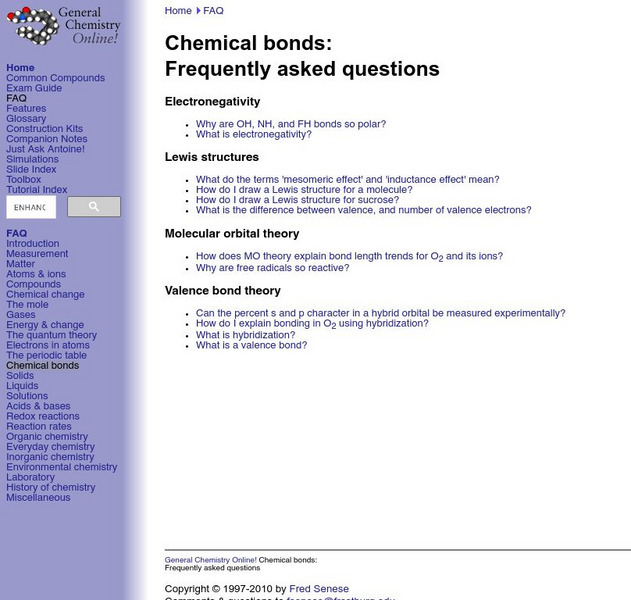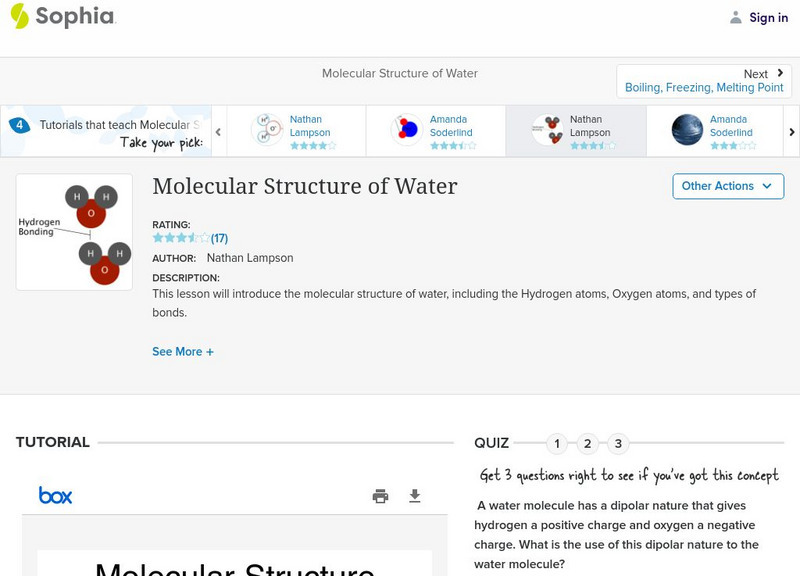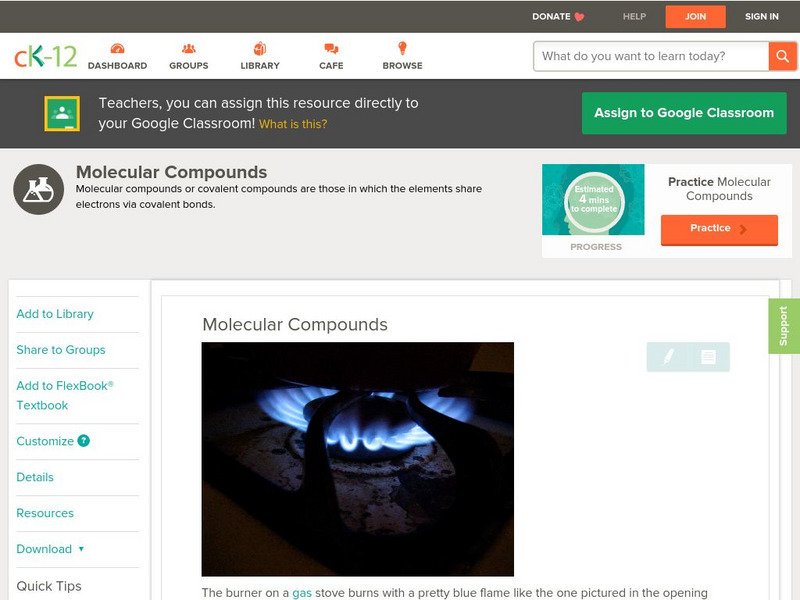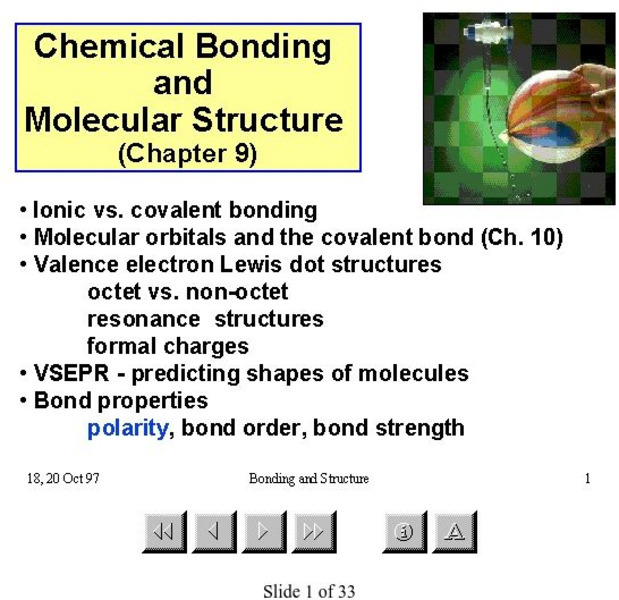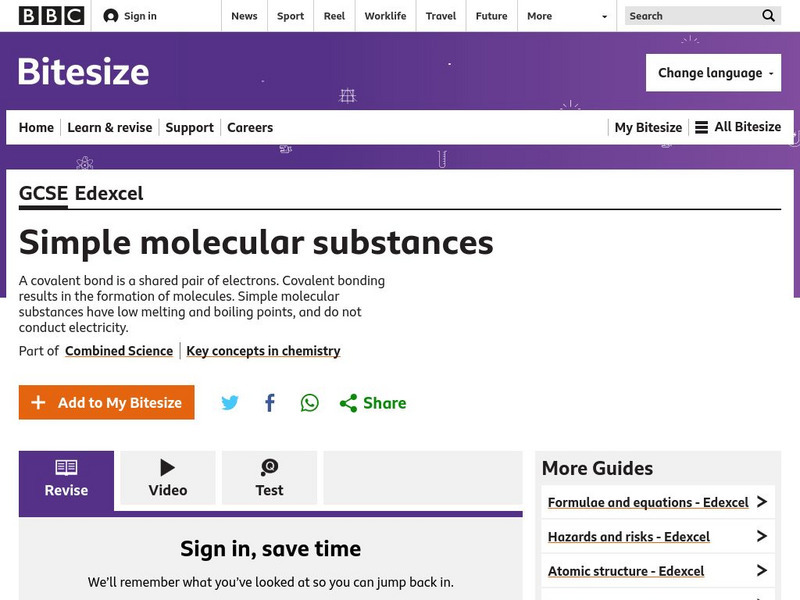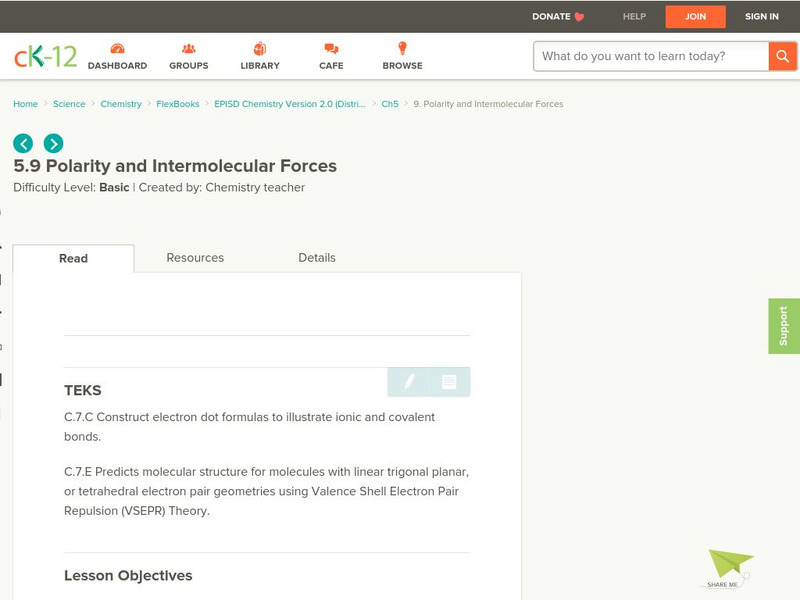National Institutes of Health
Ncbi: The Molecular Biology of the Cell: The Chemical Components of a Cell
Advanced chapter of the book "The Molecular Biology of the Cell" describes and provides illustrations of our most current understanding of the chemical makeup of cells and their components. Explains in detail how electron activity keeps...
Other
C4 Molecular Library: Alkynes
The C4 molecular library has models of alkynes that can be rotated and examined in 3D. Choose viewer, select the hydrocarbon menu from CONTENTS and scroll down to alkynes.
CK-12 Foundation
Ck 12: Molecular Geometry
[Free Registration/Login may be required to access all resource tools.] The following online tutorial explains the basis of VSEPR theory. It helps students predict the shapes of molecules and polyatomic ions using VSEPR theory and it...
Concord Consortium
The Molecular Workbench Database: Energy Conservation in Chemical Reactions
Follow the energy conversion from potential to kinetic in this interactive activity that explores total energy in chemical reactions.
Sophia Learning
Sophia: Molecular Structure of Water
A brief introduction to the molecular structure of a water molecule, and the chemical bonding which gives it its unique properties.
Frostburg State University
General Chemistry Online: Chemical Bonds Faq
Find answers to common questions about chemical bonds. Recognize molecular orbital theory and know how to draw a Lewis structure.
Sophia Learning
Sophia: Molecular Structure of Water: Lesson 2
This lesson will introduce the molecular structure of water, including the Hydrogen atoms, Oxygen atoms, and types of bonds. It is 2 of 4 in the series titled "Molecular Structure of Water."
Sophia Learning
Sophia: Molecular Structure of Water: Lesson 3
This lesson will introduce the molecular structure of water, including the Hydrogen atoms, Oxygen atoms, and types of bonds. It is 3 of 4 in the series titled "Molecular Structure of Water."
Simon Fraser University
Chem1 Virtual Textbook: Molecular Orbitals
Acting as an overview from the General Chemistry Virtual Textbook, this site explores the topics related to molecular orbitals including bonding and antibonding MOs, molecular orbital diagrams, sigma and pi orbitals, and more.
CK-12 Foundation
Ck 12: Physical Science: Molecular Compounds
[Free Registration/Login may be required to access all resource tools.] Definition of covalent compound, how they are named and how they differ from ionic compounds.
State University of New York
State University of New York: Molecular Orbital Theory
This exercise displays the molecular orbitals for a few small molecules and examines how to classify each.
Michael Blaber, PhD
Florida State University: Molecular Geometry and Bonding Theories
This article from the Florida State University contains information on multiple bonds and orbitals. Great charts and pictures are shown to help the educational process. Definitely a great site to check out on the subject.
Chiral Publishing
Chiral Publishing: An Introduction to Chemistry: Molecular Structures: Metals
Ever wondered what the molecular structures of common metals really look like? With this three-dimensional animation, see all of the bonds within the molecules from all directions.
Chiral Publishing
Chiral Publishing: An Introduction to Chemistry: Molecular Structure: Audio Book
This audio book, narrated by Mark Bishop, describes the formation of covalent bonds. Lewis dot structures help highlight the valence electrons used to determine which bonds form. Also find links to animations and tutorials about other...
Chiral Publishing
Chiral Publishing: An Introduction to Chemistry: Molecular Structures: Amines
Investigate three common amines from all angles by viewing these 3-D molecules. Manipulate the structures to see every bond.
American Chemical Society
Middle School Chemistry: Lesson Plans: Temperature Changes in Dissolving
Media-rich lesson in which students discover that it takes energy to break bonds, and that energy is released when bonds are formed during the process of dissolving. They also determine whether dissolving is either exothermic or...
McMaster University
Mc Master University: Molecular Structure
This PowerPoint presentation features 33 slides that explain chemical bonding and molecular shape.
Concord Consortium
Concord Consortium: Molecular Workbench: Strength of Intermetallic Bonds
View two different substances made from the same two elements. Observe the different strengths of bonds between the two different substances.
Concord Consortium
Concord Consortium: Molecular Workbench: Self Assembling Lattice Structure
View this simulation to see how lattice structures are formed when particles of different shapes and charges form bonds.
Other
Atoms in Motion: Molecular Dynamics
These programs are classical 2-dimensional molecular dynamics simulations. Such simulations compute the motions of atoms by summing (integrating) all of the forces that the atoms exert on each other. These forces arise from changes in...
Chiral Publishing
Chiral Publishing: An Introduction to Chemistry: Molecular Compounds: Audio Book
Learn all about molecular structures in this easy-to-understand, audio book. See how valence electrons determine how atoms bond together, and look at the bonding inside some of the most common molecules around you.
Chiral Publishing
Chiral Publishing: An Introduction to Chemistry: Molecular Structure: Power Point [Pdf]
This power point covers the molecular structure chapter from "An Introduction to Chemistry". It reviews the main ideas and shows many examples of covalent bonding from valence electrons. Also includes detailed steps to drawing lewis dot...
BBC
Bbc: Gcse Bitesize: Covalent Bonds
A covalent bond is formed between non metal atoms, which combine together by sharing electrons. Covalent compounds have no free electrons and no ions so they don't conduct electricity.
CK-12 Foundation
Ck 12: Polarity and Intermolecular Forces
[Free Registration/Login may be required to access all resource tools.] The following online tutorial describes how the electronegativity difference between two atoms in a covalent bond results in the formation of a nonpolar covalent,...







